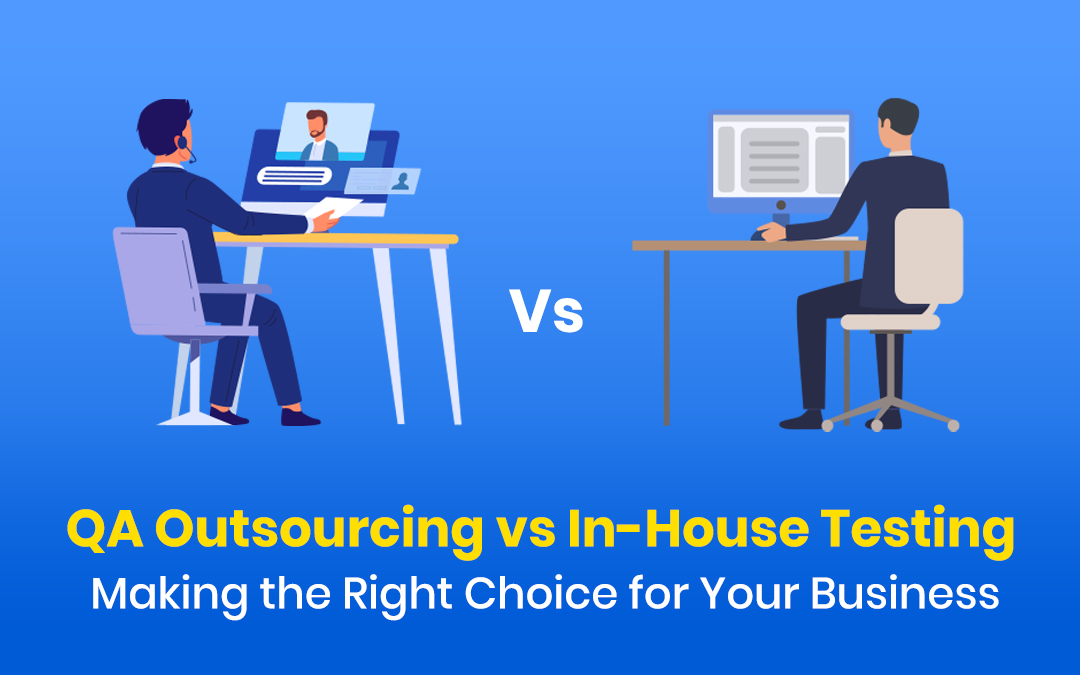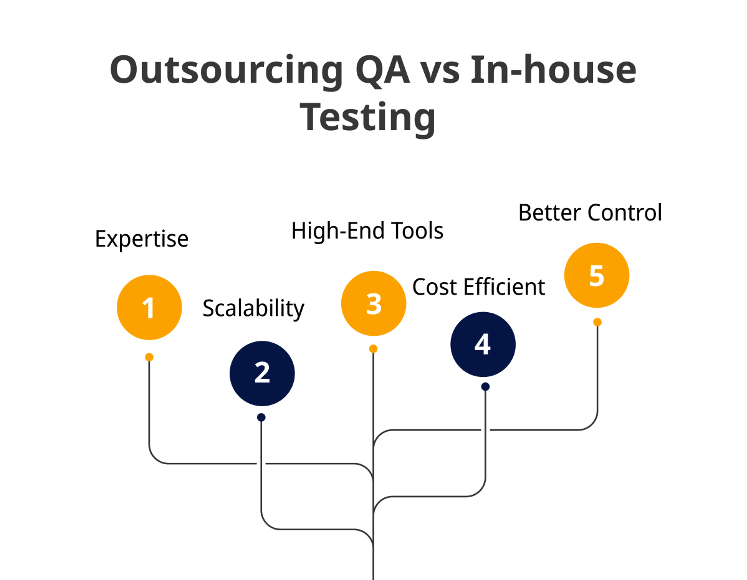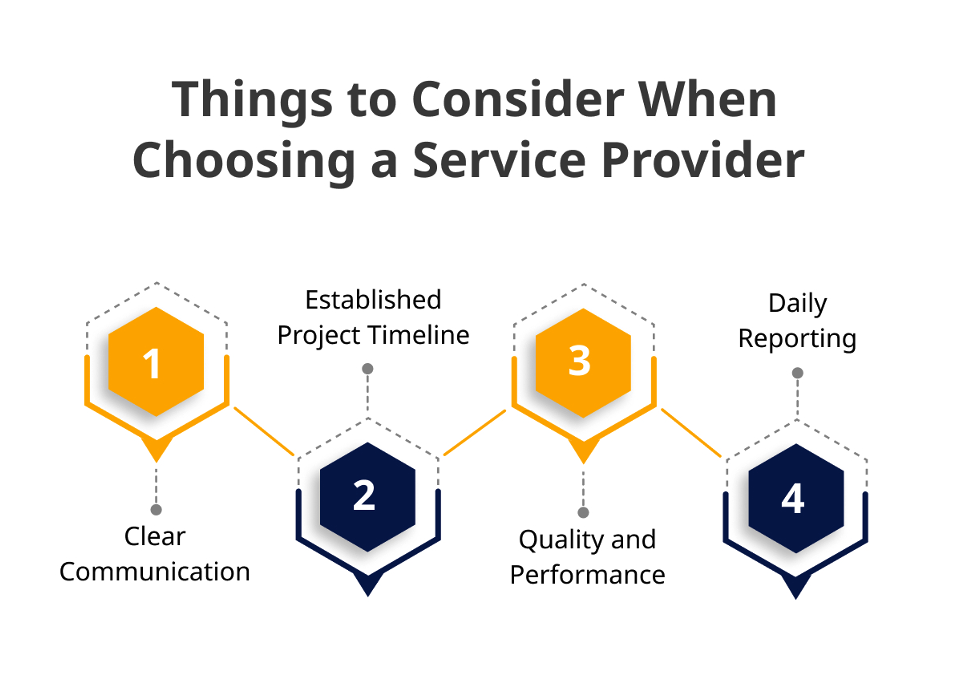
The decision between outsourced QA and in-house testing is critical. Each offers unique advantages. How do you determine which path will lead to higher efficiency and better outcomes?
Comparing QA outsourcing costs with maintaining an internal team reveals key differences. Weighing these factors can help identify the best solution for improving testing efficiency and product quality.
This blog will help you explore the benefits and drawbacks of outsourcing and maintaining in-house QA teams so you can analyze and develop your software testing strategies accordingly.
Outsourced QA vs. In-House Testing

The comparison of Outsourced QA vs. In-House Testing, which involves key benefits and drawbacks, is crucial to making an informed decision that drives higher efficiency and better outcomes. Both models offer unique advantages, and the right choice depends on your organization’s needs, goals, and resource availability.
Expertise
- In-house: An in-house QA team may provide a deep understanding of the company’s products and culture; this is one of the in-house testing pros. However, their expertise is often limited by the company’s internal processes and available resources.
- Outsourcing: QA outsourcing connects businesses with global experts who bring a diverse range of testing methodologies and a broader perspective. This can lead to more comprehensive testing, improving both coverage and quality.
Scalability
- In-house: Limited by resource availability, in-house teams can face delays, especially during high-demand periods like product launches. Scaling up often requires long-term commitments like hiring, which may not be ideal for short-term projects.
- Outsourcing: QA outsourcing firms offer greater flexibility, allowing you to scale the team up or down based on project needs without the long-term overhead of maintaining full-time staff. This enables faster delivery without compromising quality.
Access to High-End Tools
- In-house: Budget constraints may prevent your in-house team from accessing the latest testing tools, which can negatively affect the quality and efficiency of the testing process.
- Outsourcing: QA outsourcing firms invest in cutting-edge tools and technologies as a core part of their service, ensuring that your product benefits from the most advanced testing solutions available.
Reduced Employee Overhead
- In-house: Maintaining a full-time QA team involves considerable overhead, including salaries, benefits, training, and infrastructure costs. Employee benefits like insurance and paid leave add to the expense.
- Outsourcing: By outsourcing, businesses can reduce overhead. External teams operate independently, saving costs on benefits and administration while still delivering the necessary QA services.
Control and Oversight
- In-house: One of the main advantages of in-house testing is its direct control. Managers can quickly adjust priorities, oversee the process, and ensure company goals and culture alignment.
- Outsourcing: Outsourced QA teams may lack the same level of direct control, but with clear communication, regular updates, and agreed-upon KPIs, you can maintain a high level of transparency and quality oversight.
Choosing between outsourcing QA and In-house testing hinges on your business’s specific needs. Outsourcing offers scalability, access to specialized expertise, and significant savings compared to the cost of In-House QA, making it an excellent choice for companies requiring flexibility and rapid turnaround times. On the other hand, in-house teams may be better suited for projects that require deep product knowledge and continuous alignment with company goals.
Outsource QA vs. In-House Testing: Which One is Better?
In-house testing provides tighter control, greater confidentiality, and seamless communication, making it well-suited for businesses that require deep integration between QA and development or those with long-term testing needs.
The choice between in-house vs outsourced QA testing isn’t easy since both approaches bring different benefits to the companies. Outsourcing QA benefits in cost saving and providing specialized testing knowledge, whereas in-house testing can offer direct communication, collaboration, and a skilled team.
Factors to Consider Before You Outsource Software QA and Testing Services?
Software testing is a crucial phase of development. Most companies may need skilled in-house software testers to execute complete software testing. Thus, hiring an outsourcing service specializing in software performance testing solutions would be better.
However, choosing the right company is a cumbersome process. It is important to thoroughly research and evaluate potential outsourcing partners to ensure they have the necessary expertise and experience. Additionally, seeking recommendations from other companies who have used similar services can help in making an informed decision. Before choosing an outsourcing software testing company, here are some key aspects to consider.

- Clear Communication: Clear communication is crucial in a partnership business. Confirm all your doubts in the initial phase of the business. Be precise with your regular virtual meetings, decisions over mail, etc., to avoid misunderstandings and ensure smooth collaboration.
- Establish a Project Timeline: In the onboarding phase, you must ensure they plan and propose the project goals and objectives for successful software testing. They must also define all requirements for their outsourcing service for future endeavors.
- Confirm Quality and Performance Benchmark: Be precise with your requirements. What do you expect from them, and how do you want things to be done? It is suitable for both parties to avoid discord in the project's initial phase, clearly with the project manager.
- Daily Reporting: Regular reporting and monitoring help foster a transparent and honest business culture between the companies. You will receive periodic updates on the project's status and manage accordingly.
Improve in-house testing efficiency by outsourcing leading software testing teams. These cost-effective solutions involve highly skilled experts who carry out the procedures for a robust software application.
Conclusion
The decision between in-house QA and outsourced QA benefits depends on your organization's long-term strategy. Whether you prioritize the scalability and advanced tools offered by outsourcing or value the close QA team management of an in-house approach, the right choice will empower your team to deliver top-tier products with precision and efficiency.
Get in touch with the most trusted Software Testing & QA Outsourcing company. This guide will help you streamline your process of finding the right service provider. You can identify the ideal service provider more quickly by considering this blog.
Share this post
Leave a comment
All comments are moderated. Spammy and bot submitted comments are deleted. Please submit the comments that are helpful to others, and we'll approve your comments. A comment that includes outbound link will only be approved if the content is relevant to the topic, and has some value to our readers.

Comments (0)
No comment